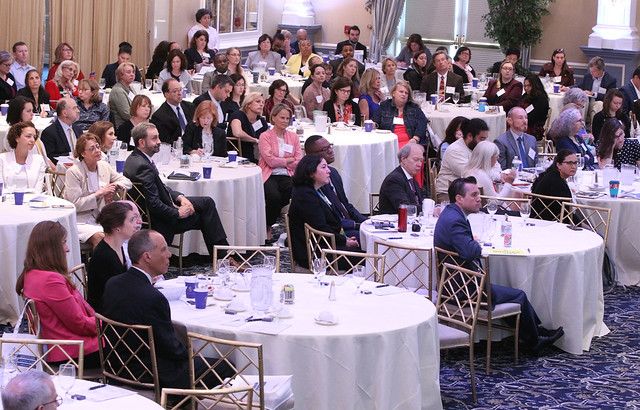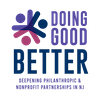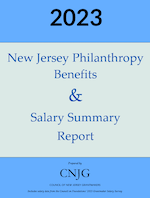Site Search
- resource provided by the Forum Network Knowledgebase.
Search Tip: Search with " " to find exact matches.
This weekly conference call series welcomed New Jersey-based grantmakers along with national funders and provided an opportunity for grantmakers to hear from a wide range of experts in the field of disaster philanthropy. This series started on November 5, 2012, one week after Sandy struck New Jersey, and continued through March 25, 2013. The written summaries of each recording are listed below.
Resources gathered from our colleagues at other philanthropy-serving organizations, state nonprofit associations, and city, state, and federal governments.
Philanthropy Serving Organizations Resources
Candid: Funding Summary for Global Philanthropic Response
Center for Disaster Philanthropy
Disaster Philanthropy Playbook
Complex Humanitarian Emergencies: Philanthropy’s Role in Recovery Webinar - Held 2/13/2020
COVID-19 Coronavirus: How Philanthropy Can Respond Webinar - Held 3/5/2020
COVID-19: Past Epidemics and Vulnerability - Lessons for Funders Webinar and Webinar Slides - Held 3/26/2020
COVID-19: Making Effective Rapid Response Grants Webinar and Webinar Slides - Held 4/14/2020
COVID-19: Managing Multiple Disasters Amid the Pandemic Webinar - Held 4/28/2020
Report: Philanthropy and COVID-19 in the First Half of 2020 - May 2021
Report: Philanthropy and COVID-19 Measuring One Year of Giving - March 2021
Report: Philanthropy and COVID-19 Examining Two Years of Giving - May 2022
Center for High Impact Philanthropy: COVID-19 Pandemic: Resources
Council on Foundations
Philanthropy’s Response to Coronavirus Outbreak Resource Page
Sharing Approaches to COVID-19 Community Response Webinar and Webinar Slides - Held 3/12/2020
Funders: Sign the Council on Foundations’ Pledge to act with urgency, loosen restrictions, reduce what you ask of non-profits, contribute, communicate, and listen.
Exponent Philanthropy:
Resources for Lean Funders
Blog: How Lean Funders Are Responding to COVID-19
Funders Together to End Homelessness:
COVID-19 Response and System Redesign: Recommendations for Philanthropy to Support Solutions to End Homelessness
Grantmakers for Effective Organizations: Smarter Grantmaking Practices During—and Beyond—COVID-19
Minnesota Council on Foundations: Coronavirus Webinar and Webinar Slides - Held 3/4/2020
National Center for Family Philanthropy
COVID-19: Response and Recovery Resources
Family Philanthropy’s Response to COVID-19 Webinar - Held 3/27/2020
National Center for Responsive Philanthropy: Local Foundation Funding for Immigrant & Refugee Groups
Philanthropy New York
COVID-19 Updates & Resources
Preparing for COVID-19: Philanthropy’s Response in Times of Crisis Webinar - Held 3/12/2020
Philanthropy Network of Greater Philadelphia: Philanthropy’s Response to the Coronavirus
United Philanthropy Forum
3/12 Letter to Congress - Include Nonprofits in Coronavirus Package
3/18 Letter to Congress - Nonprofit Community COVID-19 Stimulus Letter
State Nonprofit Association Resources
New Jersey Center for Nonprofits: Resources for Non-Profits in Response to the COVID-19 (Coronavirus) Outbreak
1st Rapid Response Survey Report
2nd Rapid Response Survey Report
Washington Nonprofits: Open Letter to Funders
Government Resources
Center for Disease Control and Prevention: Coronavirus Disease 2019 (COVID-19)
City of Newark: News & Updates
Federal Emergency Management Agency: A Guide to the Disaster Declaration Process and Federal Disaster Assistance
NJ Department of Health: Up-to-date Information about the Coronavirus (COVID-19) in New Jersey
State of New Jersey: COVID-19 Information Hub
U.S. House of Representatives: House passes HR 6201: Families First Coronavirus Response Act
World Health Organization: Coronavirus disease (COVID-19) outbreak
Additional Resources
Condon O’Meara McGinty & Donnelly, LLP: Guidance for Private Foundations
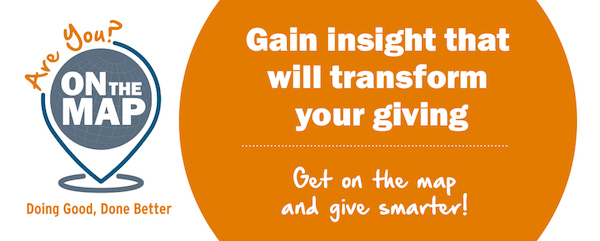
Get on the map and give smarter
Get on the Map is an exciting data-sharing initiative designed to dramatically improve the quality and availability of giving data for our region. Using this tool to put your grantmaking in context will provide valuable insights that can transform your giving.
Knowing how other foundations or corporations are funding in a certain geographic area or with a specific nonprofit can make everyone’s work more effective.
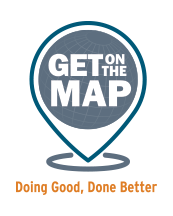 Imagine real-time answers to questions like:
Imagine real-time answers to questions like:
- How are others serving at-risk youth?
- Are organizations in our region receiving enough capacity building support?
- Who else funds economic development in our rural communities?
Through a partnership with Candid (formerly the Foundation Center) and the United Philanthropy Forum, Get on the Map enables CNJG members to see the scope of their grantmaking, find natural funding partners, and gain deeper understanding of New Jersey’s philanthropic landscape.
Watch the short video below to learn how easy it is to Get on the Map!
It starts with sharing your giving data
Your data will power valuable resources for your organization and our region, including access to the CNJG Foundation Funding Map, a special interactive searchable mapping platform, engineered by Candid.
When you share your data, you control your story. No one knows your grantmaking better than you. Tell your story, your way is good for the sector because better information benefits everyone. Join the community of funders sharing their data to ensure the field is acting on the best possible information. Share Now!
Self-Paced Training for Funders on Using Candid
Candid has also launched a new, free self-paced course for funders: Funding Smarter: Using Candid Tools to Inform and Share Your Foundation’s Work. The course is meant to help funders use Candid’s mapping, data, and knowledge tools to better identify funding peers, potential grantee partners, identify funding connections and gaps, and learn from knowledge other funders have already shared. It also highlights the value of sharing data with Candid.
CNJG is tracking philanthropy’s response to the coronavirus pandemic by elevating our “Get on the Map” Campaign partnership with Candid (formerly Foundation Center). Candid recently launched their new coronavirus map, as a part of their coronavirus webpage. Now, we need your help to share funding efforts related to the coronavirus pandemic, so your COVID-19 grants can get on this new map. The more data that they can gather to complete the map, the more useful this resource will be for your organization.
Learn how you can share your data with Candid in this webinar as Kati Neiheisel, EReporting Liaison will walk us through the why and how of sharing data, and how sharing grants data informs the sector, locally, regionally, and globally. It is critical to be transparent and share this information with philanthropy in the coming weeks and months. Tracking this data will help coordinate and inform all of NJ Grantmakers' efforts for COVID-19 response and relief.
After this demonstration, we will hear from Linda Czipo, President and CEO at the Center for Non-Profits for an update on the results of the 2nd Rapid Response Coronavirus Nonprofit Survey conducted from April 3 to April 7. Linda will share information on nonprofits most urgent needs to better inform your grantmaking during this crisis. For results from the first survey, visit here.
Cost: Free for CNJG Members and NonMember Grantmakers
This program is only open to Grantmakers.
Webinar Video
By now you’ve heard the sad news. One of New Jersey’s most recognized, accomplished, and beloved leaders in the philanthropic sector passed away on Sunday, January 28.
Jeffrey Vega, President and CEO, Princeton Area Community Foundation, CNJG Board Chair from 2021 to 2023, and Board Trustee from 2016 to 2023, succumbed to an especially rare and aggressive form of cancer.
Jeff joined the CNJG Board of Trustees in 2016. As Board Chair, he led and guided CNJG through the pandemic years, a leadership transition, and strategic planning process. His legacy of leadership includes the 2023 - 2025 Strategic Plan, the creation of a Racial Equity Taskforce, now a committee of the Board, strengthening and improving our governance practices and policies, our first policy agenda, and adoption of the New Jersey Principles for Philanthropy, our equity principles.
 It was with great pleasure that we celebrated Jeff at the Annual Meeting & Holiday Gathering on December 14, as he rotated off the Board, and presented him with a framed gift highlighting and praising his leadership and work with the Council. Jeff shared with me that the event was one of the best days of his life. He told me how grateful he was for the love and friendship he felt in the room. Angie, his wife, accompanied him to the gathering, and recorded the business portion of the meeting. Jeff said, when he and Angie went home, they watched the event with Nico, his son. Jeff was truly happy and touched. It meant so much to him. I’m grateful that we were able to give him that special day.
It was with great pleasure that we celebrated Jeff at the Annual Meeting & Holiday Gathering on December 14, as he rotated off the Board, and presented him with a framed gift highlighting and praising his leadership and work with the Council. Jeff shared with me that the event was one of the best days of his life. He told me how grateful he was for the love and friendship he felt in the room. Angie, his wife, accompanied him to the gathering, and recorded the business portion of the meeting. Jeff said, when he and Angie went home, they watched the event with Nico, his son. Jeff was truly happy and touched. It meant so much to him. I’m grateful that we were able to give him that special day.
The CNJG Board and team are discussing how we can honor Jeff. Once we have a better idea, we’ll share with you. In the meantime, the Princeton Area Community Foundation has created a beautiful tribute – Remembering Jeffrey M. Vega.
On a more personal note, it was an absolute joy to work so closely with Jeff in his role as Board Chair. When Jeff and I were planning the Board agendas and Board discussions, he always wanted to focus on the positive. He always wanted Board members to walk away feeling uplifted, valued, and inspired. He spoke many times about how much he appreciated his Board colleagues, and all the CNJG members. There was a certain kind of harmony that surrounded Jeff. One felt enveloped in that harmony in talking and sharing space with Jeff.
Like all of us, I can’t believe he’s gone, and I miss him. We all miss him. Rest in peace, dear friend, and colleague. Thank you for inspiring us, Jeff. You truly made a difference in the lives of so many. I can truly say that I am a better person for just knowing you. I’ve heard countless others say the same. Your legacy lives on.
Warmly,
Theresa Jacks, President and CEO
Council of New Jersey Grantmakers
Join us at the second NJ Corporate Philanthropy Network meeting of the year which will focus on what specific information you should zero in on when searching for any red flags in non-profit 990’s and financial statements. Seasoned Accountants, Sherise D, Ritter and Lovepreet Buttar, from The Mercadien Group will guide us. We’ll also touch on vetting sponsorship requests and hold our traditional round robin where meeting participants can share their burning questions/issues and lessons learned.
Lovepreet Buttar, Managing Director with Mercadien’s Nonprofit and Human Services Group, has extensive experience performing and overseeing audit engagements for various nonprofit organizations, including associations, schools, private foundations, and health and human services organizations. She is passionate about helping these organizations support their constituents and achieve their mission. She is also head of the firm’s Audit and Assurance practice and is responsible for both firm-wide and engagement-specific quality control matters and overseeing training for various for-profit, not-forprofit and government/public entities. In this role, she helps ensure the firm is using best practices that are compliant with Generally Accepted Accounting Principles (GAAP).
Sherise (Sherry) Ritter is Managing Director and Co-Chair of the The Mercadien Group’s Nonprofit and Human Services Group, as well as the Advisory Services Group. Serving as a trusted advisor, she meets with all of her clients at least once a year to advise them on topics such as tax planning and preparation, identifying risk areas and formulating solutions, strategy to meet growth goals, and multi-state and unrelated business income taxation and filing exposures. Additionally, she helps her clients with strategic planning, process efficiency and improvement studies, and mergers and acquisitions. She also specializes in the areas of cash flow management, accounting systems design, and board governance training.
Cost: Free for CNJG Members; $50 for Non Member Grantmakers
This program is only open to staff and trustees from grantmaking organizations.
Webinar Video
Resources
Blank 990 Form
990 Forms and their Schedules
The Overhead Myth: Crash Course to Fundraising Transparency
Charity Navigator's Assessment of Finances
In March 2024, Governor Murphy signed into law significant reforms to the ways that New Jersey enforces municipal affordable housing obligations under the state Supreme Court Mount Laurel doctrine. The new law creates enhanced affordable housing opportunities for New Jersey’s low-and moderate-income households, while seeking to streamline the affordable housing development process by setting clear guidelines for determining housing obligations. It is expected to reduce legal costs and judicial involvement. Join Adam Gordon, Executive Director and Emily Devenney, Grants and Development Manager of the Fair Share Housing Center for a conversation about what this new legislation means for philanthropy.
Since the revival and improved enforcement of the Mount Laurel Doctrine in 2015, New Jersey has seen a considerable increase in affordable housing production. However, there remains a substantial shortage of affordable homes in the state, particularly for very low-income residents. The legislation aims to address this gap by ensuring that every municipality contributes its fair share of affordable housing.
Key features of the legislation include a streamlined process for determining affordable housing obligations, codification of methodology for calculating these obligations, increased transparency in the housing development process, and the repeal of the state Council on Affordable Housing (COAH). Additionally, the legislation prohibits wealthy towns from avoiding their housing obligations through regional contribution agreements.
Cost: Free for CNJG Members; $50 for Non Member Grantmakers
Adam Gordon is the Executive Director of FSHC and leads FSHC’s coordinated strategy of organizing, litigation, and policy development to advance racial, economic, and social integration throughout New Jersey and the United States. Since joining the organization in 2006, he has worked to implement the Mount Laurel Doctrine which has created over 70,000 affordable homes in historically exclusionary NJ communities, litigated the largest federal fair housing case in American history, and worked to make federal disaster recovery policy more equitable. Under his leadership FSHC has secured the passage of the first statewide Fair Chance in Housing Act to limit discriminatory tenant screening policies and a landmark $305 million fund to accelerate affordable housing development. Gordon holds a B.A. and J.D. from Yale University.
Emily Devenney joined Fair Share Housing Center as the Grants & Development Manager in January 2024. She comes with experience in fundraising and community organizing, and strong connections to South Jersey, where she was born and raised (and likely will never leave). Emily has a B.A. in Economics and a Masters of Public Policy from the University of Massachusetts Amherst and a Certificate in Fundraising from Villanova University.
Webinar Video
Igniting Equitable Systems Change Together
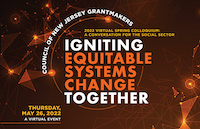
Date: Thursday, May 26
Time: 1:00 to 5:00 p.m.
On May 26, the Council brought together recognized thought leaders from philanthropy and nonprofits for a conversation exploring how the social sector can advance systems change.
Grantmakers and nonprofits grapple with complex, structural issues every day, and take on the difficult questions to move our collective work forward.
During a dynamic discussion, panelists shared strategies to empower proximate leaders, remove structural barriers and build the capacity of grassroots organizations, and shift mental models to challenge assumptions and strengthen nonprofit-funder relationships. After the panel, case study presenters highlighted three local examples of systems change, emphasizing the importance of cross-sector collaboration, collective action, and community engagement. Then, attendees gathered together for small group discussions to unpack key takeaways and discuss their own successes and challenges with systems change.
One of the most highly regarded convenings for social sector leaders in the state, the 2022 Virtual Spring Colloquium considered the power and cultural shifts needed to advance systems change through philanthropic and nonprofit partnership.
Attendees can revisit Whova to access event features such as session recordings, exhibitor virtual booths and sponsor pages, NJ Poetry Out Loud performances, and more.
| Agenda | |
| 1:00 - 1:30 pm: | Opening Session Featuring Sponsors & Exhibitors |
| 1:30 - 2:00 pm: | Break & Independently Visit with Sponsors & Exhibitor Virtual Booths |
| 2:00 - 3:30 pm: | Panel Discussion & Case Study Presentations - Igniting Equitable Systems Change Together |
| 3:30 - 4:00 pm: | Small Group Discussions |
| 4:00 - 4:15 pm: | Break & Independently Visit with Sponsors & Exhibitor Virtual Booths |
| 4:15 - 5:00 pm: | Networking Reception Featuring NJ Trivia |
Confounded by what to do and how to be in your role right now? What does it mean to be focused on a vision of racial equity, well-being, gender justice, economic health when people, institutions, and the systems that have allowed most of us to at least limp along are literally under attack?
With manufactured chaos causing increased threats and real impacts to our safety, our communities face even greater challenges in understanding how and where to strategically invest time, money, and energy. Part presentation and part experiential workshop, this mini-lab led by Change Elemental is designed to meet this moment by supporting us to move in complexity and chaos toward visions of a more just and safer future.
Participants will be invited to learn more about and/or deepen your practice of:
Advancing liberation and sovereignty
Sharing leadership and power
Valuing multiple ways of knowing
Creating space for inner work
Influencing complex systems change
Working with real-life examples, we will dive into what a future of liberation and sovereignty---a future that centers interdependent, whole people and whole communities---looks like and how we might be in support of nonprofits who are actively engaging in the strategies of blocking attacks, building power, cultivating belief, and bridging communities.
Whether you are an evaluator seeking to disrupt existing mental models for evaluating strategy or measuring impact or you're a program officer seeking ways to disrupt power dynamics and build meaningful partnership within the communities you serve, this experience will lead to specific actions for moving effectively with purpose in this moment.
What will I learn?
Session participants will leave with:
New frameworks and ideas for applying them to advance a liberatory future in complexity and chaos
A guiding question and tools to support ongoing experimentation
A taste of what practicing liberation and sovereignty can mean, be, and feel like
A call to support more spaces rooted in being in healthy, continuous, and mutually accountable relationship with self, each other, and the more than human world
Speakers
Aja Couchois Duncan, Senior Consultant, Change Elemental
Elissa Sloan Perry, Director, Prefiguring Futures, Change Elemental
Jess Solomon, Principal, Art in Praxis (former senior program officer, Robert W. Deutsch Foundation)
Trish Adobea Tchume, Vice President, Robert Sterling Clark Foundation
Who should attend?
All interested funders, regardless of roles. What to expect: presentation, practice, followed by panel discussion.
Cost: Free for CNJG Members
Presented by Philanthropy New York
This paper explores community democracy as a cultural choice and a potential organizing system for philanthropy using stories that demonstrate its principles and practices, primarily growing from the experience of northern California communities. This experience offers a framework of principles and a beginning set of conclusions about how philanthropy can develop productive partnerships from the perspective of a place-based, community democracy.
The 2020 Census is coming and it counts — in more ways than one.
The Census isn’t just a population tally. State and local governments, businesses, nonprofits and foundations, rely on Census data to allocate funding, define where services are delivered, and promote economic development. The information is valuable for health care, education, housing, transportation, and business. It helps determine congressional representation, political participation, and other fundamentals of community wellbeing and American democracy.
A full, fair count is crucial, but it isn’t guaranteed.
The Census disproportionately misses people of color, young children, and the rural and urban poor. Our state and nation have too much at stake for the social sector to stay on the sidelines.
The Council of New Jersey Grantmakers’ 2019 Spring Conference brought together foundation and nonprofit leaders throughout the state to learn what their organizations can do to make sure New Jersey is counted.
The Conference featured national and state experts who shared information and tools to meet the many challenges communities across the state will face to be counted. We heard serious concerns regarding access to the Census, hard-to-count people, and potential funding cuts and changes in the process that could hamper participation.
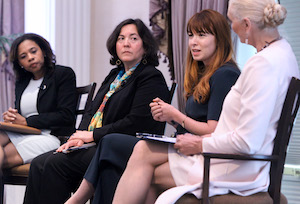 Speakers offered a number of opportunities for action and partnership, from spreading awareness about the importance of 2020 Census in your communities and networks to funding outreach efforts from grass-roots organizations. The Conference raised and answered the most important questions about the Census and what needs to be done for a complete and accurate count. Now, the social sector must build the capacity to meet this once-in-a-decade obligation to engage at the deepest level.
Speakers offered a number of opportunities for action and partnership, from spreading awareness about the importance of 2020 Census in your communities and networks to funding outreach efforts from grass-roots organizations. The Conference raised and answered the most important questions about the Census and what needs to be done for a complete and accurate count. Now, the social sector must build the capacity to meet this once-in-a-decade obligation to engage at the deepest level.
The Council of New Jersey Grantmakers looks forward to continuing conversations, partnerships, and action around the 2020 Census. Please explore our resources from the conference below and visit our webpage Philanthropy’s Role in the 2020 Census to learn more.
AGENDA
Opening Plenary: Census 101
A comprehensive update on all things census, including how the Census Bureau is getting the word out, what is guiding the planning for 2020, and what still needs to be done before Census Day.
Presenter: Jeff T. Behler, Regional Director, US Census Bureau - New York
What Philanthropy Can Do for the 2020 Census
Explore ways in which the philanthropic sector can leverage resources to ensure the most accurate census information, so the voices of undercounted groups and regions are heard in the decade to come.
Presenters: Gary D. Bass, Ph.D., Executive Director, Bauman Foundation
Vanita Gupta, President and CEO, The Leadership Conference on Civil and Human Rights
Moderator: Maria Vizcarrondo, President and CEO, Council of New Jersey Grantmakers
Session 1: Challenges to a Fair Count
Two experts in civil and voting rights law will walk us through what the citizenship question really means for the census count, and the potential impact it will have on already hard-to-count communities.
Presenters:
Ryan P. Haygood, Esq., President & CEO, New Jersey Institute for Social Justice
Ezra Rosenberg, Co-director of the Voting Rights Project, Lawyers’ Committee for Civil Rights Under Law
Facilitator: Bob Atkins, Director, New Jersey Health Initiatives--Robert Wood Johnson Foundation
Session 2: Where are the Kids? The Undercount of Children
Children are one of the largest undercounted populations in the Census. In this session, we will learn what your organization can do to prevent an undercount in 2020, and why an accurate count is essential for our children’s futures.
Presenters:
Peter Chen, Policy Counsel, Advocates for Children of New Jersey
Alana Vega, Kids Count Coordinator, Advocates for Children of New Jersey
Facilitator: Melissa Litwin, Early Childhood Program Director, The Henry and Marilyn Taub Foundation
Panel Discussion: Opportunities for Action
Nonprofit, foundation, and government leaders invite your organization to step up for the 2020 Census count. Panelists will provide concrete examples and resources to get involved now.
Panelists:
Kiki Jamieson, President, The Fund for New Jersey
Betsy Plum, Vice President of Policy, New York Immigration Coalition
Inge Spungen, Executive Director, Paterson Alliance
The Honorable Tahesha Way, New Jersey’s 34th Secretary of State, Department of State
Moderator: Linda M. Czipo, President & CEO, Center for Non-Profits
Luncheon Plenary: Call to Action for the 2020 Census: A Once-in-a-Decade Opportunity to be Counted
Another undercount for 2020 means another ten years of relying on inaccurate data to inform our state’s political representation and funding for vital resources. For too long, the census has missed disproportionate numbers of people of color, young children and the rural and urban poor, and with new challenges in 2020, participation of hard-to-count populations may be hindered further. With the count only a year away, now is the time for the philanthropic sector to step up and get New Jersey counted.
Speaker: Arturo Vargas, Chief Executive Officer, NALEO Educational Fund
CNJG thanks our conference sponsors and supporters: Signature Sponsor – PSEG; Collaborator Sponsors – The Fund for New Jersey and JPMorgan Chase & Co.; Connector Sponsors – New Jersey Natural Gas and Wells Fargo; Colleague Sponsors – FirstEnergy Foundation and Subaru of America Foundation; Exhibitor Sponsors – Glenmede and PKF O’Connor Davies; and Venue Sponsor – The Palace at Somerset Park.
Conference Photos
Additional resources, articles, and videos about the Census may be found on our webpage - Philanthropy's Role in the 2020 Census.
A corporate member queried the corporate listserve which technology tools they use for their corporate giving system/platform. CNJG compiled the responses and combined it with previous responses from other technology systems queries to create this list of “Who Uses What Technology Systems.” If your organization is not listed, please email the names of those systems to Craig Weinrich.
Philanthropic organizations of all shapes and sizes are well positioned to support Communities for a Lifetime (CfaL). This issue brief explores four roles for philanthropy in advancing CfaL work.
This weekly conference call series welcomed New Jersey-based grantmakers along with national funders and provided an opportunity for grantmakers to hear from a wide range of experts in the field of disaster philanthropy. Series 1 started on November 5, 2012, one week after Sandy struck New Jersey, and continued through March 25, 2013. Series 2 started on September 9, 2013 and concluded on November 4, 2013. The written compendium of the recordings is listed below.
Many of your organization's key priorities — innovative grantmaking, sound management and governance, strategic partnerships — are of paramount concern to other New Jersey philanthropies as well. CNJG is the go-to center for information, connection, and leadership among a growing network of grantmakers and philanthropic organizations throughout New Jersey. Members have access to exclusive benefits and services and a powerful link to fellow funders who share a commitment to addressing critical issues affecting citizens and communities across the state.
Memberships are for the entire organization, so your entire philanthropic team (staff, trustees, and more) can access these benefits:
Show your support of CNJG by adding a Proud Member of CNJG Logo to your website.
CNJG offers quarterly New Member Orientations either via Zoom or in person for any new member organization, or new staff or new Trustees at your organization. In the interim times, CNJG can come to your office or lead a virtual orientation just for your organization.
Invite CNJG staff to present at your board meeting on a variety of topics: benefits of CNJG membership; trends in philanthropy; policy issues affecting philanthropy, or another topic of interest to you and your organization. Please contact us to arrange.
CNJG Programs
CNJG offers over 80 programs per year that focus on peer learning, best practices, professional development, networking, and updates on certain topics that affect and influence your work. Most are free for members, and members receive a significant discount to any programs with a fee, including our signature events: Spring Colloquium, Spring Conference, and Annual Meeting of Members. Read about the different events and programs we offer.
Highlights of CNJG.org Website
Online Resources - hundreds of resources, tools, documents, templates and more to assist you in your work.
Leverage the New Jersey Principles for Philanthropy to promote continuous learning and reflection at your organization.
Take action to decrease the power imbalance between philanthropy and nonprofits through our joint initiative with the New Jersey Center for Nonprofits, Doing Good Better.
Read through a plethora of information on Diversity, Equity, Inclusion work; philanthropy's disaster response, including COVID; and past CNJG work.
Find and connect to your peers using our online member directory. Only logged-in CNJG members can see full contact information for member organizations and their staff and/or trustees.
Benchmark the benefits you offer your staff and trustees, and compare salary rates for staff using our triennial Philanthropy Benefits and Salary Survey. Last published in 2023, we’ll be asking for your information in 2026. The salary data is gathered by the Council on Foundations through their annual Grantmaker Salary and Benefits survey.
Discover peers funding in similar areas through Affinity Groups and corresponding listserves.
Post any available philanthropic jobs at your organizations for free on our job board.
Save on administrative costs through several different discounts on a variety of products and services for grantmaking organizations.
Through the website and our member newsletters, CNJG can share your grant award announcements, personnel changes, and articles or announcements from your organization with our membership, informing them of your activities. Please email CNJG’s Manager of Communications Shakirat Odunsi with links to the announcement on your website, so we can include in our own communications.
Public Policy Updates and Advocacy
CNJG keeps its members informed of public policies that affect grantmaking institutions and their non-profit partners. Members can attend Foundations on the Hill (a joint program of the United Philanthropy Forum, the Council on Foundations, and Independent Sector), or read about CNJG’s work on the 2020 Census. We plan on revisiting this work for the upcoming 2030 Census.
Read through CNJG’s Policy Agenda, that guides our policy work on behalf of all the CNJG membership, under the direction of CNJG’s Policy Committee of the Board.
CNJG though our membership with the United Philanthropy Forum, we share programs and information from our fellow ‘philanthropy-supporting organizations’ from across the country that offer insights and policy strategies for philanthropy.
Newark Philanthropic Liaison
A model for the country, CNJG’s Newark Philanthropic Liaison, in collaboration with Newark’s Office of the Mayor, harnesses interest, attracts resources, and fosters greater effectiveness towards policy and programmatic areas affecting Newark’s residents.
Newsletters
CNJG News: Emailed at the start of each month, CNJG News provides timely information on members, member benefits, job announcements, and more. Please share your grants news, personnel changes, and announcements with us to include!
Grantmaker Learning Calendar: Bi-monthly emails describing upcoming programs for members.
Corporate Philanthropy Brief: Distributed monthly to the contacts of all CNJG’s corporate members, the Brief offers links to articles that help you learn more about CSR and how to get the best results from your giving.
Family Ties: A monthly e-publication specifically for CNJG’s family foundation members offers helpful articles, news, and tips for managing the unique needs of this brand of philanthropy.
You can also follow us on Twitter, LinkedIn, and Facebook.
Publications
2023 New Jersey Philanthropy Benefits & Salary Summary Report: Produced every three years, this detailed benchmarking report looks at the benefits offered by philanthropic organizations to your staff and trustees. Salary information is provided by the Council on Foundations’ annual salary survey.
Disaster Philanthropy Playbook: A partnership with the Center for Disaster Philanthropy, in association with the United Philanthropy Forum, the Disaster Philanthropy Playbook website, created in response to Superstorm Sandy, brings together a meaningful compilation of early stage response ideas, tested models and innovative strategies employed by funders throughout the world after any natural or human-created disaster.
What Every Grantmaker Should Know & Frequently Asked Legal Questions: an “oldie but a goodie” guide to help the state’s philanthropic community understand what the ethical, legal, and fiduciary requirements and obligations are for grantmaking organizations, no matter the size of grants.
Add Your Leadership Voice to a CNJG committee
Membership in the Council of New Jersey Grantmakers offers grantmakers the opportunity to deepen their experience with the organization by serving on a Board committee, co-chairing an affinity group, or serving on CNJG’s board of trustees. Committee members lead, recommend and develop policies that help us shape our organization. Affinity Group co-chairs work with CNJG staff to develop programs for the members. The Board offers fiduciary and governance responsibilities for the entire organization.
Unique Benefits for Specific Members
For Family Foundations:
Family Ties newsletter
Family Philanthropy Online webinars with National Center for Family Philanthropy; offered every month
Family Foundation listserve
Family foundation members can access family foundation resources in the National Center for Family Philanthropy’s Knowledge Center.
For Corporate Members:
Corporate Philanthropy Brief newsletter
A New Jersey Corporate Philanthropy Network Affinity Group
Corporate Funders listserve
For Community Foundation Members:
DAF holders and component funds, like Impact 100 groups, can attend CNJG programs at the member rate. Please share relevant programs with interested DAF holders.
DAF holders can also receive CNJG News and our calendar emails should they choose
CNJG staff can introduce CNJG to your DAF holders at any of your gatherings
Community Foundation CEO listserve, which connects to a national listserve of Community Foundation CEOs from across the country.
To learn more about CNJG membership, contact Craig Weinrich.
This advocacy and civic engagement toolkit is designed for community and public foundations that want to educate and encourage their grantees about getting involved in civic and policy activities to increase organizational capacity and impact. While its primary focus is on the grantmaking activity of these foundations, the toolkit also addresses rules and guidance for policy involvement by foundation officials acting on behalf of their foundations.
This tool for unstaffed foundations includes an accountability self-assessment and a legal checklist. It is divided into nine topic sections, each of which is divided into three levels, which can help foundations tailor the tool to meet their specific interests and needs. Also included are an Excel spreadsheet to help tabulate responses, an extensive accountability resource list, and a glossary of key words and concepts used in the tool.
As we witness the initial impact of Hurricane Dorian, we are reminded that many of our communities are still targets for further devastation from this storm over the next few days.
While we recognize that many of us have survived recent hurricanes like Sandy and Maria, we also know that the struggle continues, and we need to do our best to help meet the needs of current victims caught in the wake of the storm.
In light of this situation, we are providing our membership with the latest information to help you determine how your organization might engage in response and recovery efforts.
Resources
- The Center for Disaster Philanthropy has created a Hurricane Dorian disaster profile, which provides updates on the storm as well as information on the areas of greatest need
- The Center for Disaster Philanthropy has also launched the CDP 2019 Atlantic Hurricane Season Recovery Fund to support communities that will be affected by Hurricane Dorian. This fund focuses on medium- and long-term recovery, with the understanding that individuals and communities will need the support of private philanthropy for months and years to come as they navigate the road to recovery.
- The Disaster Philanthropy Playbook is a comprehensive handbook outlining best practices and innovative approaches that the philanthropic community can adopt in addressing recovery after natural disasters. CNJG’s lessons learned in the aftermath of Superstorm Sandy helped lead the creation of this Playbook.
- Locally in Florida, the Miami Foundation for a Greater Miami created a Hurricane Dorian resource page.
- The Jessie Ball duPont Fund resource Creating Order from Chaos: Roles for Philanthropy in Disaster Planning and Response provides a framework for steps that can be taken for philanthropy to respond to disasters.
- The New York Times has released an article sharing multiple ways to help Hurricane Dorian survivors in the Bahamas.
- Charity Navigator has created a list of high-rated organizations providing aid and relief for Hurricane Dorian for both short-term and long-term relief.
- Sadly, CNJG’s post Sandy work and the briefings hosted and compiled by CNJG still hold lessons for today. You can review the briefings from Series 1 and Series 2 in either audio or written format. The briefings provide timely, relevant information about how grantmakers can help in the aftermath of a major storm.
Finally, if you think it would be useful, we’ll convene an open-forum conference call for CNJG members to share how your organization might be thinking about your own response efforts. If you’re interested in connecting with your colleagues for this kind of discussion, please contact me, and we will set up a call.
Yours in solidarity,
Maria Vizcarrondo, President and CEO
Council of New Jersey Grantmakers
We’re thrilled to announce the Council of New Jersey Grantmakers’ 2024 Spring Colloquium – a timely conversation exploring the transformative power of Artificial Intelligence (AI) and data in the social sector.
Empowering the Future: Harnessing AI and Data for Philanthropic Social Impact will take place on Tuesday, June 18th, 2024, at the New Brunswick Performing Arts Center opening at 9:30 AM with networking and check-in, Resource Marketplace, and continental breakfast.

The main event begins at 10:30 AM and will feature a distinguished panel discussion moderated by Jean Westrick, Executive Director of the Technology Association of Grantmakers, (TAG). Our esteemed panelists will delve into critical topics such as:
- Optimizing Problem-Solving: How can AI enhance our ability to address social issues without sacrificing human connection?
- Equity in Action: How can we ensure AI is used ethically and fairly to promote a more equitable society?
- Funding for the Future: How are foundations leveraging AI for strategic grantmaking initiatives?
- Gen Z and AI: What role will AI play in shaping the future generations of philanthropic leaders?
Following lunch and conversation, we’ll have 2 afternoon sessions focused on the practical side of AI usage for foundations and nonprofits. The Spring Colloquium is your chance to gain valuable insights from leading experts, network with fellow New Jersey grantmakers and nonprofit leaders, and discover innovative strategies for using AI to maximize your own social impact.
Registration is now open! We’re opening registration exclusively to CNJG members until Friday, April 26, so please secure your spot for this essential event by registering today.
As this is such an important topic for our sector, I invite you to consider sponsorship of the event. Sponsorship is an excellent opportunity to support our work, while also increasing visibility for your own organization and philanthropic efforts. We have a number of outstanding sponsorship opportunities for this event. Please reach out to me if you need more information or require an online application to secure your sponsorship. We can also customize a sponsorship package for you. Thank you to our sponsors to date: Connector Sponsors - Campbell Soup Company, Sixers Youth Foundation and Robert Wood Johnson Foundation.
In the coming weeks, we’ll share more details about the 2024 Spring Colloquium, including the full panel line-up. Stay tuned for further updates in the newsletter and on our website.
We look forward to seeing you there!
Sincerely,
Theresa Jacks, President and CEO
Council of New Jersey Grantmakers

